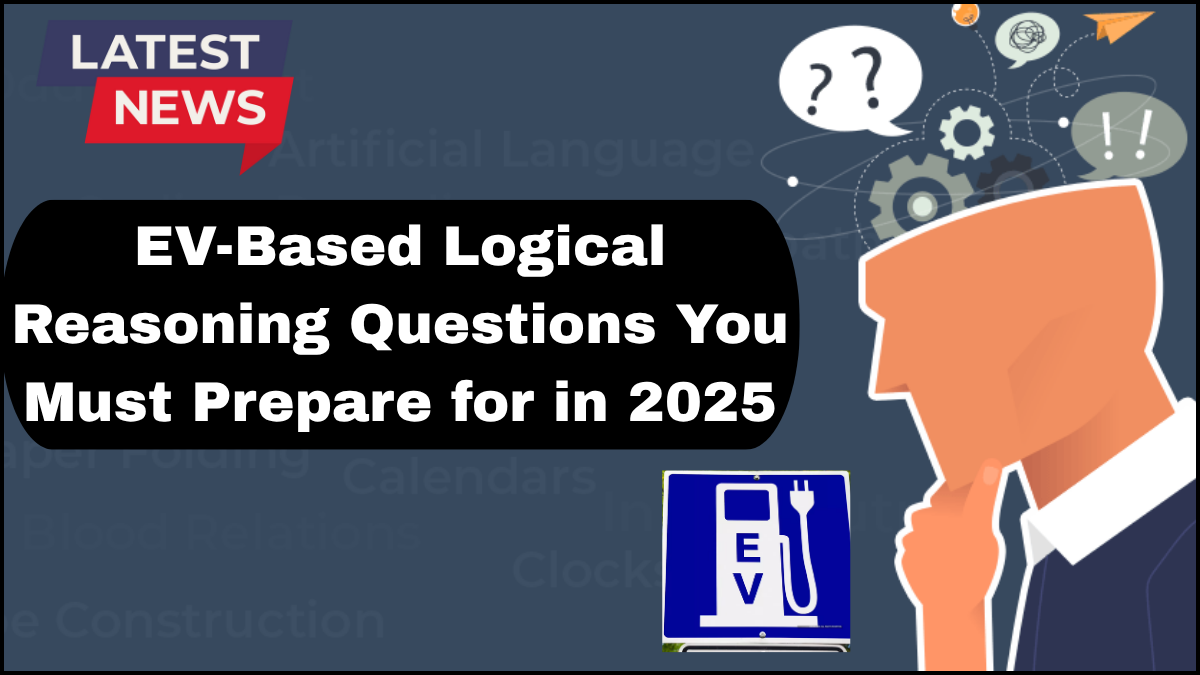As electric vehicles (EVs) become central to discussions on sustainability and innovation, they’re also making their way into the world of competitive exams. In 2025, EV-based logical reasoning questions are expected to play a significant role in testing candidates’ ability to analyze, infer, and solve problems in real-world scenarios. Whether you’re preparing for engineering entrance exams, government recruitment tests, or industry-specific assessments, mastering competitive exam auto reasoning is a must.

Below, we break down key categories, sample formats, and strategies to help you tackle vehicle-related logic questions effectively.
What Are EV-Based Logical Reasoning Questions?
These are reasoning problems that incorporate themes, technologies, or scenarios centered around electric vehicles. Unlike traditional logical reasoning questions, EV-based ones assess your understanding of technological trends while gauging your cognitive skills.
For instance, you might encounter questions like:
- “A city introduces a fleet of 200 EV buses. If 40% require battery replacements every 18 months, how many will still have original batteries after 36 months?”
- “If a charging station services 12 EVs per hour and operates 10 hours daily, how many EVs can be charged in 5 days?”
These questions blend math, analytical thinking, and real-world EV knowledge.
Why Are They Important in 2025?
EVs are no longer futuristic concepts. Governments and companies worldwide are pushing for 100% electric fleets by 2030. As a result, hiring processes are aligning with evolving industries.
Competitive exam auto reasoning is adapting to include current industry standards. This trend ensures candidates are not just theoretically capable but also industry-aware.
Key Categories of EV-Based Logical Reasoning Questions
1. Quantitative Logic with EV Context
Expect percentage, ratio, and probability questions set in EV scenarios. These help assess your numerical accuracy under applied contexts.
Example:
If 3 out of every 10 EV owners upgrade their battery within 2 years, and there are 12,000 owners, how many have upgraded?
2. Sequencing and Scheduling
These questions test how well you can arrange EV manufacturing or charging processes logically.
Example:
Four EV models (A, B, C, D) go through battery testing, software installation, and safety checks. If Model A completes safety before software, and Model B finishes software after battery testing, determine the correct sequence.
3. Analytical Puzzles with Vehicle-Based Logic
Puzzle-based questions might involve EV logistics, such as route planning or resource optimization.
Example:
An EV delivery company uses 5 types of vehicles for different cities. If only certain types can operate during heavy rainfall, and others during night hours, determine the best combination for an overnight storm delivery schedule.
4. Cause-Effect and Decision-Making
These evaluate how decisions affect outcomes in EV scenarios. Useful in managerial or policy-based exams.
Example:
A city bans non-EVs during weekdays. As a result, EV ride-sharing demand increases. What is the likely impact on EV battery wear-and-tear and maintenance cycles?
How to Prepare Effectively
- Familiarize with EV Terminology: Understand terms like regenerative braking, battery degradation, charging infrastructure, etc.
- Practice Mixed-Context Problems: Combine traditional logical reasoning practice with EV scenarios.
- Stay Updated: Read news on EV developments. Many questions are inspired by current trends.
- Mock Tests with Thematic Variations: Attempt reasoning papers with sections dedicated to EV-based logic.
Mistakes to Avoid
- Ignoring Context: Don’t just focus on numbers; understand the EV backdrop.
- Overgeneralization: Not all EVs behave the same. A Tesla is not the same as a two-wheeler e-scooter.
- Outdated Data Use: EV technology evolves fast; rely on current figures only for assumptions.
FAQs: EV-Based Logical Reasoning for Competitive Exams
Q1. Are EV-based reasoning questions only relevant for engineering exams?
No. They appear in business, management, and general aptitude tests too, reflecting industry relevance.
Q2. How technical do these questions get?
They stay at an application level. You won’t need deep engineering knowledge, but conceptual clarity is important.
Q3. Is vehicle-related logic a standalone section?
Usually not. It’s embedded within logical or analytical reasoning sections under applied contexts.
Q4. How can I differentiate between standard and EV-based logic problems?
Look at the scenario. If it revolves around EV manufacturing, usage, policy, or logistics, it’s EV-based.
Q5. What’s the best source for practicing such questions?
Use recent mock tests, government sample papers, and EV industry case studies integrated into reasoning sets.
click here to learn more